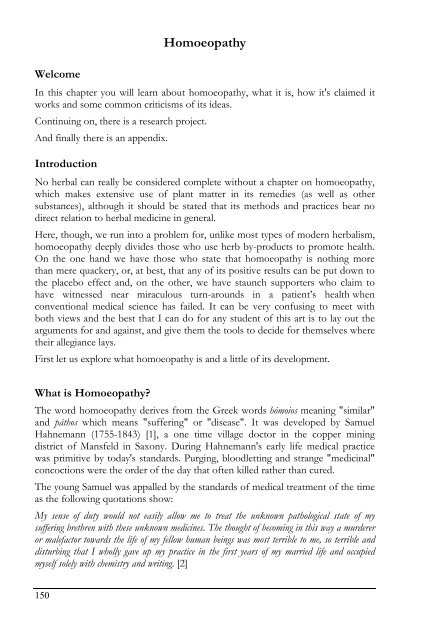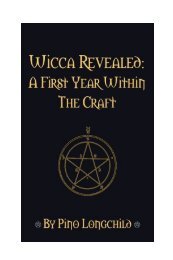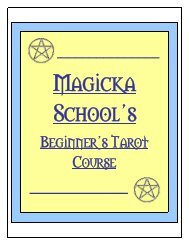A Magickal Herball Compleat.pdf - Magicka School
A Magickal Herball Compleat.pdf - Magicka School
A Magickal Herball Compleat.pdf - Magicka School
You also want an ePaper? Increase the reach of your titles
YUMPU automatically turns print PDFs into web optimized ePapers that Google loves.
Welcome<br />
150<br />
Homoeopathy<br />
In this chapter you will learn about homoeopathy, what it is, how it's claimed it<br />
works and some common criticisms of its ideas.<br />
Continuing on, there is a research project.<br />
And finally there is an appendix.<br />
Introduction<br />
No herbal can really be considered complete without a chapter on homoeopathy,<br />
which makes extensive use of plant matter in its remedies (as well as other<br />
substances), although it should be stated that its methods and practices bear no<br />
direct relation to herbal medicine in general.<br />
Here, though, we run into a problem for, unlike most types of modern herbalism,<br />
homoeopathy deeply divides those who use herb by-products to promote health.<br />
On the one hand we have those who state that homoeopathy is nothing more<br />
than mere quackery, or, at best, that any of its positive results can be put down to<br />
the placebo effect and, on the other, we have staunch supporters who claim to<br />
have witnessed near miraculous turn-arounds in a patient’s health when<br />
conventional medical science has failed. It can be very confusing to meet with<br />
both views and the best that I can do for any student of this art is to lay out the<br />
arguments for and against, and give them the tools to decide for themselves where<br />
their allegiance lays.<br />
First let us explore what homoeopathy is and a little of its development.<br />
What is Homoeopathy?<br />
The word homoeopathy derives from the Greek words hómoios meaning "similar"<br />
and páthos which means "suffering" or "disease". It was developed by Samuel<br />
Hahnemann (1755-1843) [1], a one time village doctor in the copper mining<br />
district of Mansfeld in Saxony. During Hahnemann's early life medical practice<br />
was primitive by today's standards. Purging, bloodletting and strange "medicinal"<br />
concoctions were the order of the day that often killed rather than cured.<br />
The young Samuel was appalled by the standards of medical treatment of the time<br />
as the following quotations show:<br />
My sense of duty would not easily allow me to treat the unknown pathological state of my<br />
suffering brethren with these unknown medicines. The thought of becoming in this way a murderer<br />
or malefactor towards the life of my fellow human beings was most terrible to me, so terrible and<br />
disturbing that I wholly gave up my practice in the first years of my married life and occupied<br />
myself solely with chemistry and writing. [2]




